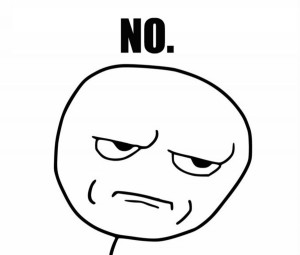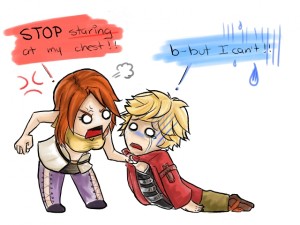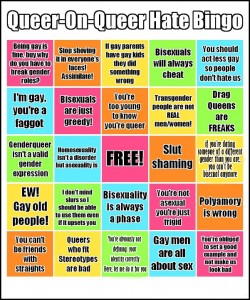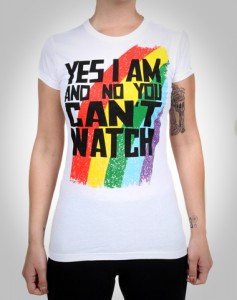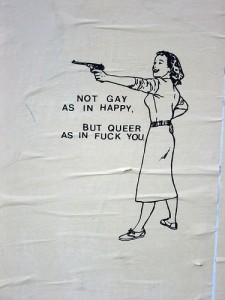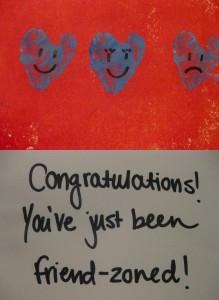Before I started dating, I knew and listened to a lot of men. One of their biggest complaints was that women aren’t honest or straightforward enough. “Why don’t women just say no?” they lamented. “I waste all this time pursuing women who don’t want me because I don’t know for sure that they don’t want me!”
It sounded right to me. I believe in honesty, straightforwardness, and directness. I believe in telling people the truth and communicating how you feel as clearly as possible. It seemed absurd to me that all these women weren’t just saying no when no was what they meant. Sentiments like those found in this article, which was posted to xoJane and made the rounds yesterday, could’ve been snatched from my lips in those days.
I think the solution is simple — we simply stop using excuses. If a man is coming on to you (and you are not interested — if you are, go for it, girl!), respond with something like this: “I’m not interested.” Don’t apologize and don’t excuse yourself. If they question your response (which is likely), persist — “No, I said I’m not interested.”
Just be honest and all will work out better, right?
You guessed it: wrong. It’s not always so simple for all women.
In my experience, many men take any kind of response from a woman they’re hitting on, any kind of reaction at all, to be good. The theory that all publicity is good publicity is not lost on those kind. By saying “no” to a man like that, a woman is acknowledging his presence and the fact that he is hitting on her, which, alone, is a win for him. He could take it as a challenge, a reason to engage and pursue, an opportunity to debate the woman as to his merits as a man.
Other men take it further and believe that a no is merely a yes in disguise. A “no” will mean escalation, often into the physical: cornering, following/stalking, groping, and so on. Still other men take it even further, interpreting the “no” as a challenge to their manhood and a personal insult to them. Reactions range from insults (“you’re not even that hot! no wonder you’re single, turning down a good dude like me!”) to threats (“I’ll show you what a real man is!”) to physical violence (grabbing, pushing, shoving) to various forms of sexual assault (so-called “corrective rape” is an extreme, LGBT-specific example of this).
All that for daring to express a lack of interest in a particular male someone.
The alternative? Lying in a way that those types of men understand. Men with such sexist views will be more likely to leave a woman alone, or at least not harm her, if she tells him that she’s “taken” by another man. It’s similar to street harassment: a woman is far less likely to be hassled by men on the street if she’s accompanied by one or more men. Obviously, not all men are like that, but women often have no way of knowing if a man is that kind of man until after that fact, and some of us are not okay taking that chance.
Honesty is only the best policy when it’s a two-way street, when your word is fully accepted as honest by the other person. In the case of some men with some women, such is hardly the reality of the situation. Feminist theory is all fine and well until, say, there’s a man much larger and stronger than you trying to grab your shoulders and force you to kiss him.
The idea that a woman should only be left alone if she is “taken” or “spoken for” (terms that make my brain twitch) completely removes the level of respect that should be expected toward that woman.
It completely removes the agency of the woman, her ability to speak for herself and make her own decisions regarding when and where the conversation begins or ends. It is basically a real-life example of feminist theory at work–women (along with women’s choices, desires, etc.) being considered supplemental to or secondary to men, be it the man with whom she is interacting or the man to whom she “belongs” (see the theory of Simone de Beauvoir, the story of Adam and Eve, etc.).
And the worst part of the whole situation is that we’re doing this to ourselves.
It’s gross, and it’s messed up, but alas, this is the world in which we live — which is why that last line makes my brain twitch. Some of us aren’t “doing it to ourselves,” we’re making choices based on reality. I’d love to quote Simone de Beauvoir to some sexist who can’t take no for an answer, but unless it’s online, to do so often represents far from the safest choice.
It disgusts me to my core that I have to use my partner as a shield against men who can’t take no for an answer. It upsets me that those men don’t respect my consent, my agency, and my ownership of my body. It infuriates me that my word is not taken seriously. Every time I use such an excuse, I’m angry. Unfortunately, in the end, my anger is safer for me than some man’s.


